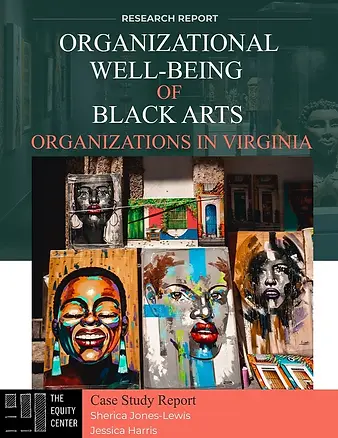Jessica Harris
director, educator, researcher

research


From Preservation to Reparation: Descendant Engagement and Museums
Prepared by The American Alliance of Museums
Author: Jessica Harris
November 2024
An opinion piece envisioning a future in which descendants of enslaved communities have an equitable, reparative seat at the table as we strive toward true repair and stronger museums.
Organizational Well-being of Black Arts Organizations in Virginia
Prepared by The Karsh Institute for the Redress of Inequity Through Community-Engaged Scholarship
Authors: Dr. Sherica Jones-Lewis and Jessica Harris
October 2023
Arts organizations created by, for, and with communities of color leave an incredible impact on their communities. In a predominantly Eurocentric, western society such as the United States, Black arts organizations become safe havens for Black individuals to create and connect (Bamrick, 2020). In recent years, there has been a push to document the impact of BIPOC organizations more fully (Voss & Voss, 2021). However, there has not been much research devoted to the organizational wellness of Black arts organizations. This study examines the question: What mechanisms do Black arts organizations utilize to remember, fortify, and advance organizational well-being?

The Transformative Power of Theatre in Rural Communities
The power of theater can transform lives! Theater educator and activist Jessica Harris describes the ways in which exposing students to the magic of the performing arts can make a difference, using her work with Empowered Players as a case study. Jessica is a veteran director and teacher with a passion for equity in arts, and hopes to inspire all students to find their voice and make the world a better place.
Supporting Students in Rural Regions in the Age of Distance Learning
Publication: Arts Praxis
Author: Jessica Harris
As theatre educators shift to embracing virtual and distance learning strategies, it is important to recognize that not all online spaces are created equal when it comes to ensuring positive outcomes for students. For communities in rural areas, virtual learning might be difficult or practically inaccessible, due to lack of reliable internet or inability to facilitate remote work. Furthermore, virtual spaces may prove to be challenging in the replication of ensemble-oriented work that fosters students’ social skills and self-concept. This lack of access and support creates inequitable outcomes for students in rural Fluvanna County, Virginia. Reflecting upon Fluvanna’s arts education nonprofit Empowered Players (EP), this article addresses the significant challenges that arts educators in rural areas may face in implementing distance learning. The article highlights important considerations for teaching artists striving to replicate emotionally-supportive environments, and for those working to eliminate barriers to entry into the virtual space. Using my experiences with EP as a case study, the article seeks to provide possible answers and innovations for teachers searching for equitable and sustainable models for distance-learning / socially-distant theater education.

